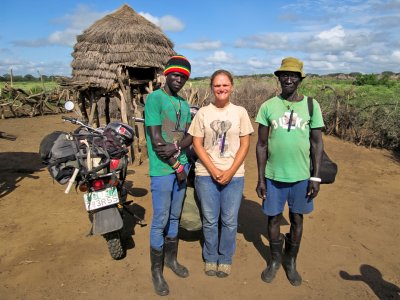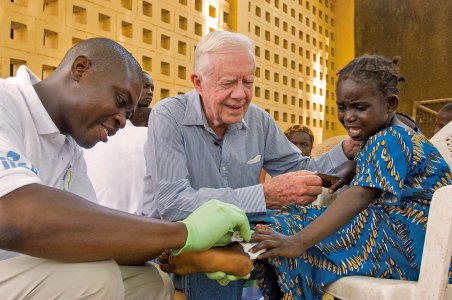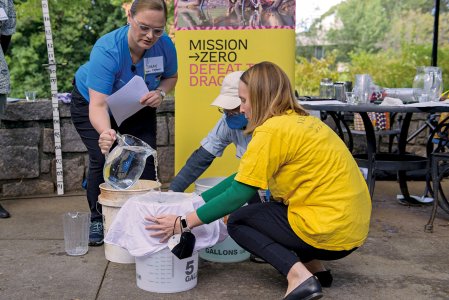So Close
Header photo: Sarah Yerian at The Carter Center in Atlanta. (Photo by Caroline Joe)
Sarah Yerian and Her Team From the Carter Center Are Nearing Their Historic Goal of Eradicating Guinea Worm Disease
While the world’s attention has focused on COVID-19, The Carter Center has been quietly nearing its goal of eradicating another terrifying disease. It would be only the second time ever, after smallpox, that we have completely conquered a disease.
At the heart of that work for the past decade has been Sarah Yerian ’06, senior associate director of the Guinea Worm Eradication Program.
Yerian and her team tirelessly work with communities in several African countries in the effort to eradicate Guinea worm disease. It would be the first parasitic disease to be eradicated and the first disease to be eradicated without the use of a vaccine or medicine.
They are so close. About 3.5 million people in 21 countries in Africa and Asia suffered Guinea worm disease, or dracunculiasis, when The Carter Center began leading an international campaign to eradicate the disease in 1986. In 2022, there were only 13 known cases of the disease in five countries, the lowest annual case total ever reported.
People contract the disease when they drink from stagnant water sources contaminated by Guinea worm larvae. Those worms then mate and grow inside the person’s abdomen. After about a year, the female worm, then about 3 feet long, slowly, slowly bores its way out of the person’s skin—an agonizingly painful and debilitating experience that can take a few weeks and impacts the ability to attend to basic needs and work or attend school. To relieve the burning sensation, victims naturally seek relief by going back into the water—and that sends larvae back into the water source and starts the cycle anew.
President and Mrs. Carter founded The Carter Center in 1982 to advance peace and health in countries around the world. Eradicating Guinea worm disease has long been a major priority of the Atlanta-based organization. Because there are no vaccines, Yerian says they work closely with ministry of health officials in each country on water treatment and education programs to change people’s behavior.
“They are sovereign countries,” she says, “and we provide the technical, financial, logistic, and operational support they need to then actually implement the program.”
It’s working.
“This is an exciting time,” Yerian says. “We’re in a really good position to eradicate Guinea worm.”
There were helicopters flying over shooting rockets and missiles and killing people, and she was coordinating the evacuation and safety of staff.
Director of The Carter Center’s Guinea Worm Eradication Program
An International Life

Yerian’s days may range from sleeping in tents and bucket bathing under the stars to updating leadership and President Carter on the Guinea worm program and the challenges in South Sudan.
“Sarah’s been through some severely traumatic situations in South Sudan, coordinating an evacuation during the outbreak of civil war in 2016,” says Adam Weiss, director of the program. “There were helicopters flying over shooting rockets and missiles and killing people, and she was coordinating the evacuation and safety of staff.”
Yerian says her “international life” has surprised a lot of people—and herself. She says when she was growing up in Cincinnati, she was the type of shy girl who might come home from a sleepover early. She didn’t really care for the outdoors, wasn’t fond of camping, and really, really hated bugs.
Pivot Point
The path from Cincinnati to Africa began during her days as a biology and environmental science major at Ohio Wesleyan. One day she stumbled onto the table of the School for Field Studies, an independent study abroad program, at OWU’s Hamilton-Williams Campus Center.
“I had this pile of library books in my arms, and this guy was saying, ‘Hey, who wants to go to Costa Rica or Kenya for the summer?’ And I said, ‘Me, me, me, me, me!’” she recalls.
She chose Kenya for the one-month, hands-on summer environmental research course doing wildlife management work.
She loved it so much that she found a way to go back. Through OWU, she received an Eli Lilly Vocational Discernment Grant to fund her work at an orphanage near The School for Field Studies’ work in Kenya. She became the school’s intern, then the student affairs manager, helping professors with their field work and supervising and advising students as they adjusted to life in Africa.
“I don’t think I would have ended up where I am if I didn’t have the opportunity to go back and really understand more about what I might be good at and where I might have an impact,” she says.
Uncharted Waters
While working with animals was interesting and fun, Yerian yearned to focus on the human-wildlife conflict, especially their connection to water.
That motivated her to go to Emory University to earn a Master of Public Health focused on global health. As part of her studies, she returned to Kenya as a visiting researcher through a partnership among Emory University, Food for the Hungry, and Millennium Water Program in Kenya, designing a qualitative study of the role of women in water management.
The rigor of Ohio Wesleyan helped prepare her for graduate studies. As a child, she’d imagined becoming a teacher, but a class with zoology professor Dennis Radabaugh called Animals in Their Environment inspired her to declare her major. “I was totally surprised when science was the track for me,” she says.
The environmental science major required a second major, and, inspired by Radabaugh’s class, she paired it with biology. She says the double-major requirement—providing a specialty—and guidance from OWU faculty proved to be crucial for her.
“I had great mentorship from Dr. David Hickcox [emeritus professor of geology & geography] throughout my time at OWU and even after,” she says.
Yerian’s work at Emory led her back to Africa as a UNICEF/Emory research fellow in Kigali, Rwanda, serving as a liaison on menstrual hygiene between that country’s stakeholders and the university.
‘A Whole New Thing’

At Emory, a professor connected her to the university’s longtime partner, The Carter Center, which led her to join the South Sudan Guinea Worm Eradication Program in 2013. It was a stretch outside her comfort zone. “We were camping all the time out in the villages, using latrines—it was a whole new thing for me,” she says. “I’m proud of myself for not letting what could seem like a discomfort get in the way of doing really meaningful things and having really amazing life experiences.”
For the next six years, her work included supervising hundreds of village volunteers and staff members, developing training and treatment protocols, providing health education about the disease, distributing different types of filters for water, using larvicide, and containing cases that emerge with contact tracing.

Once someone displays disease symptoms, they are monitored daily by a community volunteer who also provides treatment. “That includes helping to remove the worm slowly,” Yerian says. “It might take a few days to a few weeks to fully extract a worm, because you want to do it slowly, pulling a little bit each day.”
Weiss says Yerian is “an amazing, very adept, very perceptive leader and is able to navigate the high-level vision piece all the way to the nuts and bolts and mechanics of how do we actually do this.” He adds, “From the day I met her in South Sudan, she’s always stood out as being able to connect dots and tap into her deep care for people in general. I think that’s part of what sets her apart.”
A Twist and a Curveball

Since 2019, Yerian has been senior associate director of The Carter Center’s overall Guinea Worm Eradication Program. She focuses on offering technical, financial, and logistical support to partners in the remaining countries facing Guinea worm, now down to 13 cases.
“This last mile of the campaign is challenging. There’s been a twist and a curveball,” she says. Guinea worm disease has emerged in domestic dogs in Chad and in cats in Mali, Angola, and Ethiopia.
But she’s confident they’ll get the job done. “We’ve got a whole network of researchers working on the remaining questions,” she says.
Now based in Atlanta, Yerian says the pandemic has slowed her travels. When she does go to Africa, she now brings her 1-year-old son. Her husband lives in Kenya, where he focuses on wildlife management.
If Guinea worm disease goes the way of smallpox, eradicated forever, Yerian hopes to continue working to implement health programs. “That is where my passion is, executing and trying to make things happen on the ground.”
She remains grateful for her foundational experience at Ohio Wesleyan.
“It’s important to not be afraid to explore and figure out what it is that you enjoy, and that you’re good at,” she adds. “There are lots of people on campus who can provide mentorship on life skills to figure out, how do I determine what I love to do, what I’m good at, and how do I become better.”
Julianne Hill is a freelance writer, producer, and educator based in Chicago.
